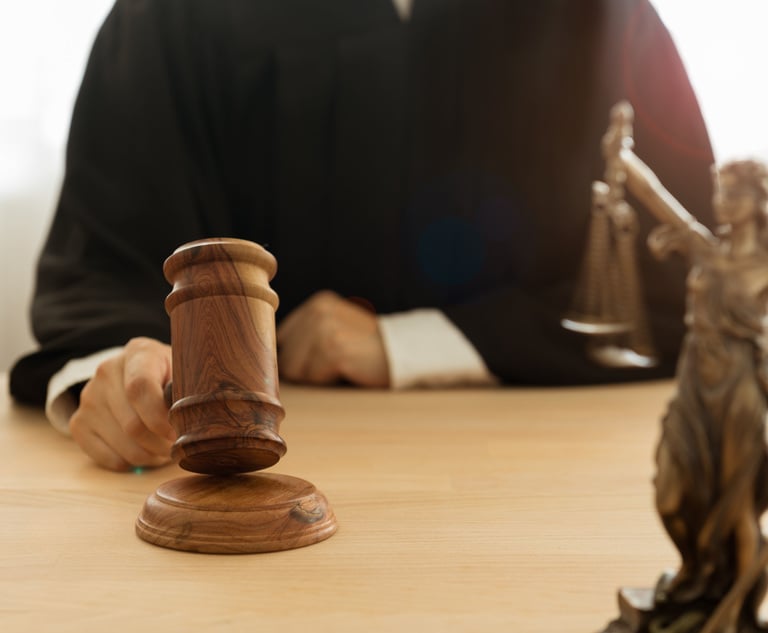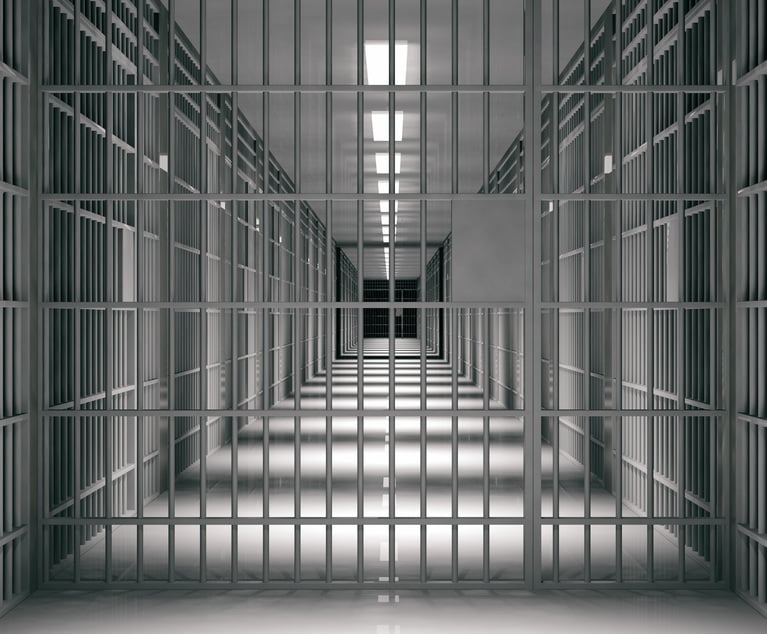Facing $750K Fee Application in Church Grant Suit, Morris County Seeks Federal Injunction
In papers filed in federal court, the Morris County freeholders have asked for an injunction against a fee application filed in New Jersey Superior Court by the Freedom From Religion Foundation.
April 15, 2019 at 05:25 PM
4 minute read
 Credit: David Smart/Shutterstock.com
Credit: David Smart/Shutterstock.com
After a defeat at the state Supreme Court in a suit challenging the constitutionality of granting taxpayer funds to renovate historic churches, the Morris County Board of Chosen Freeholders has filed a suit in federal court seeking to stop a $750,000 fee application from proceeding in the case.
In papers filed in the U.S. District Court for the District of New Jersey, the freeholders asked for an injunction against a fee application filed in New Jersey Superior Court by the Freedom From Religion Foundation, the Madison, Wisconsin-based group that successfully challenged the county's grants to churches.
The freeholders also sought permission from the federal court to proceed with their grant program.
The petition comes after the state Supreme Court ruled unanimously in April 2018 that the county's grants to churches violates the New Jersey Constitution's Religious Aide Clause, which provides that citizens can't be required ”to pay tithes, taxes, or other rates for building or repairing any church or churches, place or places of worship, or for the maintenance of any minister or ministry.”
The Supreme Court took the case by direct certification after Somerset County Superior Court Judge Margaret Goodzeit granted the county's motion to dismiss the action by summary judgment.
This March 4, the U.S. Supreme Court denied a petition for certiorari filed by Morris County, effectively letting stand the New Jersey high court's ruling. On March 27, the Freedom From Religion Foundation filed a motion with the Law Division seeking to reopen the original complaint and award it fees as a prevailing party under the New Jersey Civil Rights Act, N.J.S.A. 10:2-6f.
The county said in its latest filing, on April 12, that in view of the decision of the New Jersey Supreme Court, the trial court is constrained to view the defendants as “prevailing parties” and will likely award counsel fees. Still, the county maintains that its position on the use of taxpayer funds to fix up churches is correct, even after suffering a defeat in court.
“[T]he county cannot obtain a vindication of its rights in the New Jersey state courts. Accordingly, the County asks this Court to issue an order enjoining the Defendants from seeking fees against the County in state court,” Morris County said in court papers.
The county concedes in its brief that the U.S. Supreme Court, in Younger v. Harris, warned in 1971 against federal interference with ongoing state court proceedings. But in Mitchum v. Foster, a 1972 case, the Supreme Court said federal civil rights claims under 42 U.S.C. §1983 are an exception to the Younger rule, the county contended in court papers. Citing MItchum, the county wrote, “the very purpose of Section 1983 was to interpose the federal courts between the States and the people … to protect the people from unconstitutional action under color of state law, whether that action be executive, legislative or judicial.”
Morris County made grants totaling $4.6 million to 12 churches between 2012 and 2015.
Andrew Seidel, a staff lawyer for the Freedom From Religion Foundation, said the exemption to Younger claimed by the county “doesn't apply, for a number of reasons.” Seidel added that the county “lost [its case]. You don't get to relitigate in federal court after you lose, and that's what they're trying to do,” Seidel said.
John Bowens of Schenck, Price, Smith & King in Florham Park, who represents the county in the church grants case, could not immediately be reached.
The Morris County case was taken up by the New Jersey Supreme Court in conjunction with another case concerning grants by the state Department of Education of $10.6 million to Beth Medrash Govoha, a Jewish Yeshiva in Lakewood, and $645,323 to the Princeton Theological Seminary. In that case, the court issued a separate opinion in May 2018 holding that the secretary of education should conduct hearings in order to determine whether the grants violated a constitutional provision barring use of public funds to benefit religious institutions.
This content has been archived. It is available through our partners, LexisNexis® and Bloomberg Law.
To view this content, please continue to their sites.
Not a Lexis Subscriber?
Subscribe Now
Not a Bloomberg Law Subscriber?
Subscribe Now
NOT FOR REPRINT
© 2025 ALM Global, LLC, All Rights Reserved. Request academic re-use from www.copyright.com. All other uses, submit a request to [email protected]. For more information visit Asset & Logo Licensing.
You Might Like
View All


Judge Jablonski and Chief Justice Rabner Both Acted Completely Properly
4 minute read
In 2-1 Ruling, Court Clears Way for Decade-Old Wrongful Imprisonment Suit
5 minute readTrending Stories
- 1'A Death Sentence for TikTok'?: Litigators and Experts Weigh Impact of Potential Ban on Creators and Data Privacy
- 2Bribery Case Against Former Lt. Gov. Brian Benjamin Is Dropped
- 3‘Extremely Disturbing’: AI Firms Face Class Action by ‘Taskers’ Exposed to Traumatic Content
- 4State Appeals Court Revives BraunHagey Lawsuit Alleging $4.2M Unlawful Wire to China
- 5Invoking Trump, AG Bonta Reminds Lawyers of Duties to Noncitizens in Plea Dealing
Who Got The Work
J. Brugh Lower of Gibbons has entered an appearance for industrial equipment supplier Devco Corporation in a pending trademark infringement lawsuit. The suit, accusing the defendant of selling knock-off Graco products, was filed Dec. 18 in New Jersey District Court by Rivkin Radler on behalf of Graco Inc. and Graco Minnesota. The case, assigned to U.S. District Judge Zahid N. Quraishi, is 3:24-cv-11294, Graco Inc. et al v. Devco Corporation.
Who Got The Work
Rebecca Maller-Stein and Kent A. Yalowitz of Arnold & Porter Kaye Scholer have entered their appearances for Hanaco Venture Capital and its executives, Lior Prosor and David Frankel, in a pending securities lawsuit. The action, filed on Dec. 24 in New York Southern District Court by Zell, Aron & Co. on behalf of Goldeneye Advisors, accuses the defendants of negligently and fraudulently managing the plaintiff's $1 million investment. The case, assigned to U.S. District Judge Vernon S. Broderick, is 1:24-cv-09918, Goldeneye Advisors, LLC v. Hanaco Venture Capital, Ltd. et al.
Who Got The Work
Attorneys from A&O Shearman has stepped in as defense counsel for Toronto-Dominion Bank and other defendants in a pending securities class action. The suit, filed Dec. 11 in New York Southern District Court by Bleichmar Fonti & Auld, accuses the defendants of concealing the bank's 'pervasive' deficiencies in regards to its compliance with the Bank Secrecy Act and the quality of its anti-money laundering controls. The case, assigned to U.S. District Judge Arun Subramanian, is 1:24-cv-09445, Gonzalez v. The Toronto-Dominion Bank et al.
Who Got The Work
Crown Castle International, a Pennsylvania company providing shared communications infrastructure, has turned to Luke D. Wolf of Gordon Rees Scully Mansukhani to fend off a pending breach-of-contract lawsuit. The court action, filed Nov. 25 in Michigan Eastern District Court by Hooper Hathaway PC on behalf of The Town Residences LLC, accuses Crown Castle of failing to transfer approximately $30,000 in utility payments from T-Mobile in breach of a roof-top lease and assignment agreement. The case, assigned to U.S. District Judge Susan K. Declercq, is 2:24-cv-13131, The Town Residences LLC v. T-Mobile US, Inc. et al.
Who Got The Work
Wilfred P. Coronato and Daniel M. Schwartz of McCarter & English have stepped in as defense counsel to Electrolux Home Products Inc. in a pending product liability lawsuit. The court action, filed Nov. 26 in New York Eastern District Court by Poulos Lopiccolo PC and Nagel Rice LLP on behalf of David Stern, alleges that the defendant's refrigerators’ drawers and shelving repeatedly break and fall apart within months after purchase. The case, assigned to U.S. District Judge Joan M. Azrack, is 2:24-cv-08204, Stern v. Electrolux Home Products, Inc.
Featured Firms
Law Offices of Gary Martin Hays & Associates, P.C.
(470) 294-1674
Law Offices of Mark E. Salomone
(857) 444-6468
Smith & Hassler
(713) 739-1250






